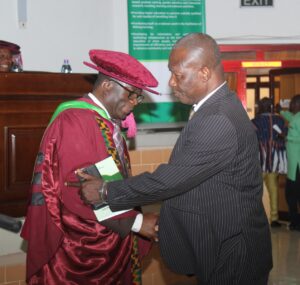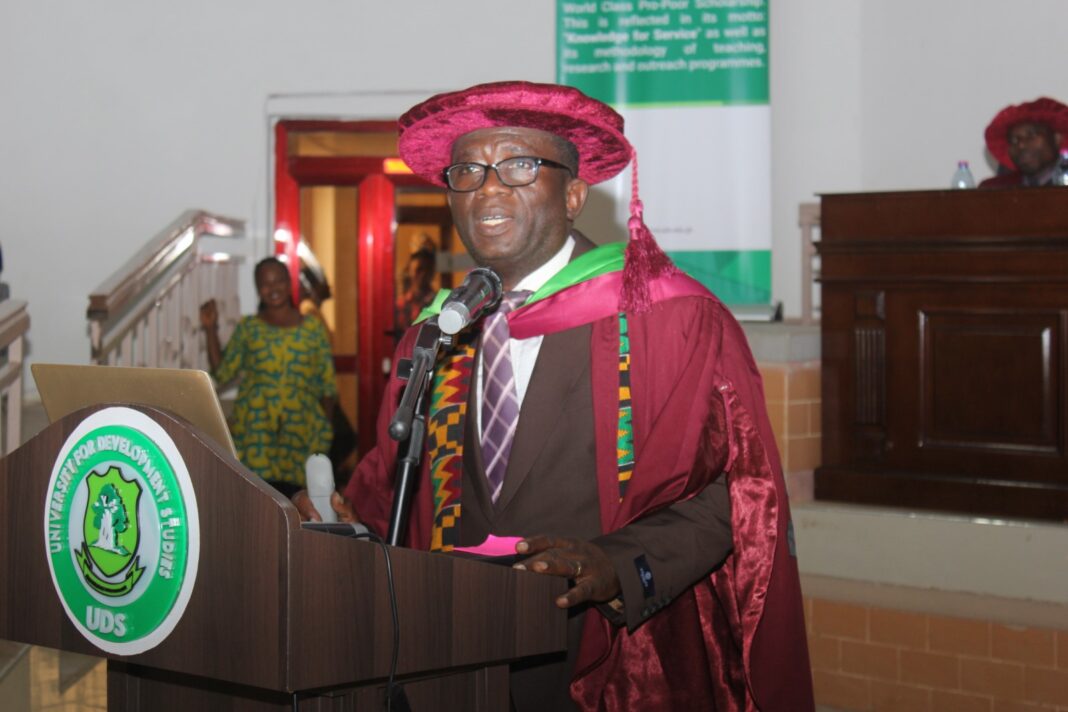The Chairman of the National Catholic Laity Council, Professor Elias N. K. Sowley, has advised Ghanaians to cultivate some of the common local fruits and vegetables such as papaya, guava, mangoes, kontomere, mushrooms, bira, ayoyo, aleefu, among others, in their gardens and backyards and also patronise indigenous ones which grow naturally to minimise the effects of contamination resulting from the inappropriate use of pesticides who poses health risks.
Professor Sowley, a Plant Pathologist and currently the Vice Chancellor of Dr. Hilla Limann Technical University (DHLTU) at Wa, was delivering the 14th Inauguration Lecture of the University for Development Studies (UDS) at the Dr. Andani Andan Academic Chamber at the Central Administration Block of UDS in Tamale on August 29, 2022
He spoke on the topic, “Pesticides use in agriculture: benefits and implications for the environment and human health”.
“Pesticides will remain useful to farmers so long as they are used appropriately with strict adherence to manufacturer’s instructions as well as national or international regulations”, Professor Sowley however clarified. He said some farmers engage in hazardous practices by using banned or restricted pesticides such aldrin, dieldrin, endosulfan, lindane, DDT, methylbromide and carbofuran which according to him does not only pose danger to themselves but also to other human beings and the environment.

Some of the hazardous practices he noted also include applying pesticides to crops too close to harvest resulting in contamination, over-dosage, applying pesticides intended for cash crops to growing food crops or applying pesticides intended for growing crops onto stored crops as well as the use of obsolete or expired pesticides and also mixing of different chemical pesticides together.
The Plant Pathologist also bemoaned the habit of not wearing protective clothing such as overalls, goggles and boots by farmers while spraying their farms. He added that the improper storage, use and disposal of pesticide containers as well as the use of pesticides by untrained or poorly trained farmers is also of great concern.
Touching on the harmful effects of pesticides on the environment, he said over 98% of sprayed insecticides and 95% of herbicides reach a destination other than their target species, including non-target species, air, water and soil.
He noted that pesticides can contaminate soil, water, turf, and other vegetation in addition to killing insects or weeds, adding that it can also be toxic to a host of other organisms including birds, fish, beneficiary insects, and non-target plants. He added that pesticide contamination of surface and ground waters can also affect aquatic fauna and flora.

On implications for human health, Professor Sowley said pesticide toxicity in humans can result in acute poisoning and long term health effects, including cancer. He added this can also increase the incidence of cancers, Alzheimer and Parkinson diseases, amyotrophic lateral sclerosis, asthma, bronchitis, infertility, birth defects, attention deficit hyperactivity disorder, among others.
He expressed worry that notwithstanding the fact that Ghana has signed a number of international agreements relating to the importation, distribution and use of pesticides such as the Rotterdam and Stockholm Conventions and also have local Laws such as the Environmental Protection Agency (EPA) Act (Act 490), Pesticide and Fertilizer Regulatory Division of the Ministry of Food and Agriculture Act 803 (2010) and Customs Division of the Ghana Revenue Authority Act 791 (2009) in place, the indiscriminate and unauthorized use of banned and restricted pesticides still abound.
He, therefore, called for strict enforcement of all Laws and Regulations pertaining to the importation and use of pesticides. In particular, he urged regulatory state agencies such as the EPA to regularly monitor food supplies for excess pesticide residues.
He also called on the Food and Drug Authority to set limits or tolerance levels acceptable for pesticide use for food meant for human consumption and take the necessary measures to prevent any violations. In addition, he urged the EPA and the Customs Division of the GRA to stop the distribution, sale and use of all banned or restricted pesticides.
Professor Sowley encouraged the production and consumption of Genetically Modified (GM) foods since they can be produced without the use of pesticides. He explained that GM crops have inbuilt resistance to some pests hence they may not require the use of pesticides and therefore poses minimal health risks to human beings.
“We cannot guarantee that the vegetables that are brought into this country from our neighbouring countries are not GM foods”, Professor Sowley argued. In addition, he recommended that further research be carried out on alternative methods of pests control including bio-pesticides which according to him may help to replace chemical pesticides with ecologically friendly technologies.
Sir Professor Gabriel Ayum Teye, the outgoing Chancellor of UDS who chaired the function, entreated Ghanaians to beware of what they eat to avoid contracting diseases and to live long, “You are what you eat”, he stated. He also advised people living in rural communities in particular, to desist from using empty chemical containers as water containers.

Several other Key Officers, Deans, Directors and Heads of Departments (HoDs) from the two Universities were present. Among those from UDS were Professors Samuel Donkor, Dean of School of Applied Economics and Management Science, Herbert Dei, Director of Dry Land Research Institute, Frederick Adzitey, HoD of Animal Science and Mr. Nurudeen Issah Abubakar, the Registrar. Those from DHLTU included Professor Baba Inusah, Pro-Vice Chancellor, Mr. Vitus Songotua, the Registrar and Mr. Karim Kuuri, Director of Finance.
Many other dignitaries and guests attended the lecture. They included Brig. Gen. Michael Kwadwo Poku, Acting General Officer Commanding the Northern Command of the Ghana Armed Forces and Mba Kpalalana Yabubu Issah who represented the Chief of Dungu on whose land UDS is located. Also present were members of the Tamale Archdiocesan branch of the National Council of Catholic Women and the Knights and Ladies of Marshall.



